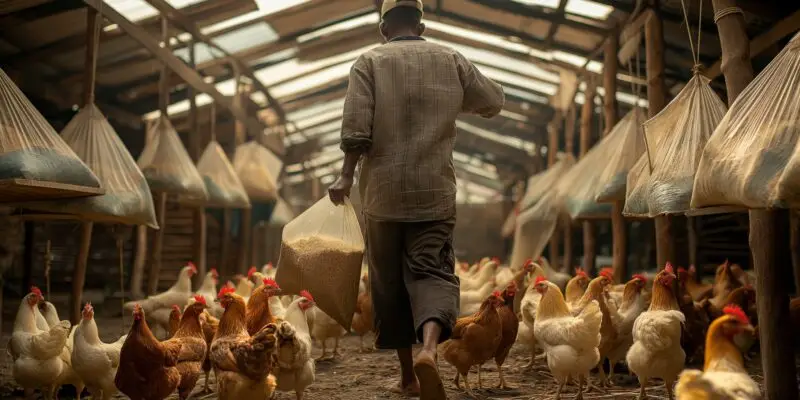Proper feeding is the cornerstone of successful Kienyeji chicken farming. A balanced diet not only promotes healthy growth but also boosts egg production and overall performance. Here’s a detailed guide on how to feed your Kienyeji chickens effectively.
Recommended Diets for Chicks, Growers, and Layers
Chicks (0-8 Weeks):
- Provide starter mash with high protein content (18-20%) to support rapid growth.
- Ensure constant access to clean, fresh water.
- Feed chicks multiple times a day in small portions to avoid wastage.
Growers (8-20 Weeks):
- Transition to grower mash with 16-18% protein to maintain steady growth.
- Add greens like kale or spinach to their diet for natural vitamins.
- Introduce grit to aid digestion if chickens are in a confined space.
Layers (20+ Weeks):
- Switch to layer mash with added calcium for strong eggshells and high egg yield.
- Provide oyster shells or crushed eggshells as a calcium supplement.
- Limit carbohydrate-rich foods like maize to avoid overweight chickens.
The Importance of Balanced Nutrition
Balanced nutrition is vital for your chickens’ health and productivity. A proper diet ensures:
- Optimal Growth: Protein supports muscle development in chicks and growers.
- High Egg Production: Calcium and balanced energy levels improve egg quantity and quality.
- Disease Resistance: Vitamins and minerals strengthen the immune system, reducing illness.
- Better Meat Quality: Well-fed chickens yield tastier, healthier meat.
Homemade Feed Recipes for Sustainable Farming
Starter Feed Recipe:
- 50% maize meal
- 20% soybean meal or fish meal
- 15% wheat bran
- 10% sunflower cake
- 5% premix (vitamins and minerals)
Grower Feed Recipe:
- 40% maize meal
- 25% wheat bran
- 20% sunflower cake or groundnut cake
- 10% fish meal or soybean meal
- 5% premix
Layer Feed Recipe:
- 35% maize meal
- 20% wheat bran
- 20% sunflower cake or groundnut cake
- 15% fish meal
- 10% crushed oyster shells or limestone
Tip: Mix feeds thoroughly to ensure uniform nutrition.
Signs of Poor Nutrition and How to Address Them
Slow Growth or Weight Loss:
- Cause: Insufficient protein or energy in the diet.
- Solution: Increase protein-rich ingredients like soybean or fish meal.
Thin or Soft Eggshells:
- Cause: Calcium deficiency.
- Solution: Add oyster shells, limestone, or crushed eggshells to the feed.
Feather Loss or Dull Appearance:
- Cause: Lack of essential vitamins and minerals.
- Solution: Include greens, vitamin supplements, and diversified feed ingredients.
Low Egg Production:
- Cause: Poor energy levels or imbalanced nutrition.
- Solution: Ensure layers have access to layer mash with balanced energy and protein.


